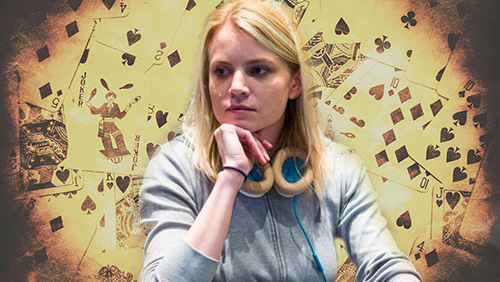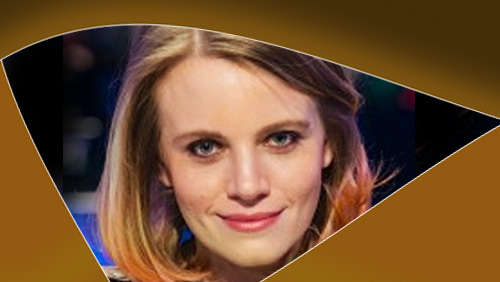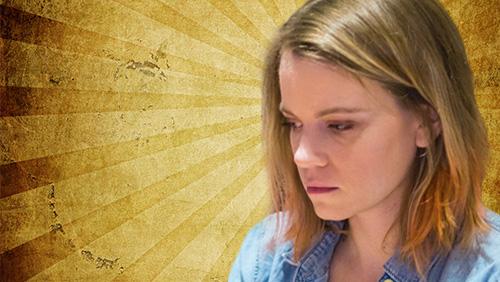Lee Davy talks to Cate Hall about her social media skirmishes, the good and bad aspects of taking the contrarian view, and much more.
I don’t know what to make of Cate Hall.
On the one hand, Cate is good for poker, stirring things up in her filterless way. But sometimes, I wonder if she was having a fondle behind the bike sheds during the lesson on choosing your battles.
*To download this audio, right click and save link as*
I’m a big believer in courting the contrarian view. But not at the expense of my work or my health. The fight to be heard can deplete energy like a member of the X-Men designed to deplete energy.
So, who is Cate Hall?
I don’t know. But I wanted to find out. I carved an image of Cate from social media and wanted to know how far off the bullseye my arrows would fly?
After an hour with her, I am still firing; still missing.
Cate told me that there was very little between the real Cate Hall and the one you see on social media. I’m not so sure that’s right. I left her with the feeling that only a few people ever get to see the real Cate Hall, and I wasn’t one of them.
What follows is an abridged version of the interview, and I encourage you to listen to the audio or watch the video to get the full experience.
Cate is wearing a Pink Floyd t-shirt, and I ask her if she remembers the first time she heard The Dark Side of the Moon?
“The very first time I listened to it was a couple of years ago when I was on acid.”
Are you a bad tripper or a good tripper?
“I think I am a good tripper. I have had a few bad trips in my time, bu t I figure out how to get out of them I guess.”
t I figure out how to get out of them I guess.”
Why have you taken acid?
“I think acid, more than any other drug, has been a good tool for me in life. It enables me to take a step back and analyse what my priorities are. I think it was instrumental in me leaving my job as a lawyer and getting into poker.”
What other experiences have you had taking acid?
“The extent that I have prioritised money and the things that I enjoy in the last few years, and in large part, those changes are a result of taking acid.”
What are your thoughts on money?
“My thoughts used to be to make as much money as I could and figure it out later, which is a common mindset for a lot of Americans in their 20s and 30s, and a lot of lawyers particularly.”
What was the big change for you with your money mindset?
“I just don’t have that much of a focus on accumulating wealth for myself. I still think that making a lot of money is good so I can do stuff with it, primarily in terms of giving it away. But I don’t think making a bunch of money is going to make me happier.”
I know you are an effective altruist, is the plan to earn as much money as you can so you can give more of it away?
“There is a lot of value in that approach, and that’s how I view poker. I’m not the biggest purist when it comes to that mindset because if I were, I would have stayed as a lawyer. But I decided to prioritise personal happiness, so I am not forcing myself to have a legal job. But as long as I am in poker I will always think its a good idea to accumulate a lot of wealth so I could give it away.”
If you had become an effective altruist when you were a lawyer, do you think you would have stayed working in the legal profession?
“Possibly, because I would have felt guilty leaving a job where I was earning a lot of money. The fact that I am not willing to go back to it now makes me feel a bit shitty, but I really don’t want to do it. I try to do good but not to the extent that it’s not a huge personal sacrifice honestly.”
Why play poker professionally?
“I got into poker sort of as a hobby when I was working full-time as a lawyer. We got live cash games in my area for the first time when Maryland legalised gambling and I viewed poker as a way to make a living and do something that I enjoyed for a few years while I figured out what I wanted to do next and that’s still my goal. I am enjoying playing, and I am improving quickly, so I want to keep putting time into it, but I don’t see poker being my calling in life.”
What’s your view on meaning & purpose?
“I definitely am in the camp of not believing there is a meaning or purpose to life necessarily. I think that where I have landed on generating meaning for myself is to try and do something to make the world a little bit better, and that’s not because there is an end edict from some moral authority but because it seems reasonable to me to make myself wealthy and as happy as possible.”
How did you develop a ‘service’ mindset?
“I had a lot of connections with the effective altruism movement before I transitioned to poker. My ex-husband got into it and eventually became co-head of the Centre of Effective Altruism in Oxford, and a number of friends and relationships I had outside of poker were also involved in it.
“When I got into poker I realised there was a whole community of people interested in it, particularly the people who formed and are involved in REG.”
How have the people you hang with changed from being a lawyer and now a poker player?
“Poker has been good for me in terms of meeting people I have a lot of common with. For most of my life, I had felt like an outcast particularly when I was a lawyer. The people I have met through poker are some of the weirdest and interesting people I have ever known.”
Define ‘weirdest’ and ‘interesting’?
“Weird is the measure to the degree people tend to deviate away from normal behaviour in society. Interesting has to do to with people’s engagement with the world and their curiosity of the world.”
What does it feel like knowing you are just about to share your contrarian view with the world and it could start WWIII?
“It doesn’t feel good. I think that people view me as someone who likes to start fights and to enjoy fighting which I don’t, but I do it a lot because I can’t stop myself. I don’t view it as a good thing. I feel a lot of anxiety when I am fighting on Twitter, but I try to say what I think is correct, do what I think is right and deal with the consequences.”
 When I read your thoughts on Twitter how much of that is Cate Hall the person and Cate Hall the brand?
When I read your thoughts on Twitter how much of that is Cate Hall the person and Cate Hall the brand?
“There is not much brand there. I like to have as little space as possible between my public identity and who I am. The reason that’s important is I spent a decade as a law student and a lawyer trying to hide a lot of aspects of my personality, and what was important to me and I’m not willing to do that anymore. If I was concerned about ‘brand’, I would be doing things very differently on Twitter…my brand would not be good.”
Your rise to prominence, technical ability apart, has a lot to do with your social media presence. Does it drive your behaviour?
“I think that I am aware of it. Getting into a lot of fights is conducive to people knowing who I am but it’s not a goal of mine. Arguing with people and having my opinion about controversial topics, being able to talk about that, and have people listen to me is a goal of mine. But it’s not like I am getting sponsorships over my fights on the Internet. It might be conducive to my brand in some way but not actually towards making a living. So there are ways that I could approach this differently that could be personally advantageous to me.”
Do you feel tired and if so what are you going to do about it?
“I am tired of it. I want to delete my Twitter account daily. But I try to remind myself that there are things I care about in the world and I have a good platform where I can talk about it, and I don’t want to throw that away too lightly. But all of the arguing on Twitter doesn’t make me a happier person, and I would be better off without it.”
Does it also affect your game negatively?
“I do make a habit of not being on Twitter when I am playing which is necessary for emotional regulation. It does affect my thoughts because it’s time-consuming irrelevancy when I could be studying or playing, so there has to be a cost to my poker game.”
Why not ignore the likes of Mike Dentale when he calls you a crack head, and instead engage in debates with Andrew Barber over differences of opinion on effective altruism for example?
“I would certainly be better served to be more selective who I get into arguments with. It was a mistake to engage Mike Dentale, I wish I hadn’t. It’s turned into a giant pain in the ass, but I can’t pull out of a heads up match now. I need to learn from it and not engage with idiots in the future.”
Are you actively pursuing a way of changing your approach?
“I think I am actually trying to engage less on Twitter. It’s a real effort, but I am not setting very concrete goals for myself. I think that’s often not the best way to go about it if you want to make a change in your life, but it’s a little bit hard for me to translate ‘don’t get engaged in idiots on Twitter’ into a set of quantifiable goals.”
Onto the American Poker Awards, did you have a speech prepared that you never used?
“I think that I had a pretty good sense going into it about what I wanted to talk about. Part of the reasons I went for the POY was because I wanted to include in my speech that it was a concept that didn’t make much sense to me.
“Then after November there was a part of me that wanted to throw that speech away and just talk about politics, but I decided it was important for me. I played so much in the second half of the year to get to this point, so I stuck with the plan.”
Given your social media standing and image, did you feel pressure to create a speech that would make waves?
“I don’t know is the honest truth. I don’t think so, but it’s hard to know your own mind, honestly. I don’t know. I think it’s good when you have a platform to focus on things you think are important in the world. That translates to always having an issue and makes me off putting to a lot of people.”
 How does ego play a role in Cate Hall’s life?
How does ego play a role in Cate Hall’s life?
“I’m not sure. I think that I am sort of like both extremes with respect to ego. I have a moderately high opinion of myself and am a kind of egomaniac at the same time I have a high ability to acknowledge character flaws that I have and not think that highly of myself so contradictory tendencies. I think that I am at both extremes of the spectrum.”
Where does the high opinion yourself come from?
“There have been many different points in my life where I have felt alienated from the world and felt most people didn’t like me and I have learned to not rely on people for myself image as a result of those experiences.”
Defence?
“I am not sure whether it’s right to characterise it as defensive. It’s a matter of survival wanting to have a realistic self-image even when other people don’t like you.”
What has your feedback been like since your speech?
“I have gotten a lot of both. More supportive than not; I got more than I expected. I have had some disagreements with a couple of people about the award and my speech especially Natasha Mercier, but by in large the response has been positive, and I am happy about it.”
Do you think you are doing more harm than good when it comes to attracting women to poker when they read the insults slung your way?
“I would say that in general, I would find it surprising if I had an effect on people’s decisions to enter poker because I don’t think too many people are aware of who I am so I can’t see anything that I say will be a deciding factor for anyone. I do see how it is damaging when the public response to me is so vitriolic, thinking of Dentale, and I think the general people’s hostility towards points like we should try to limit sexual harassment in the poker room, I think the backlash to these points, if I were someone on the periphery of this community it would make me less excited to jump into it, but I don’t think to the extent that is happening it’s really on me.”